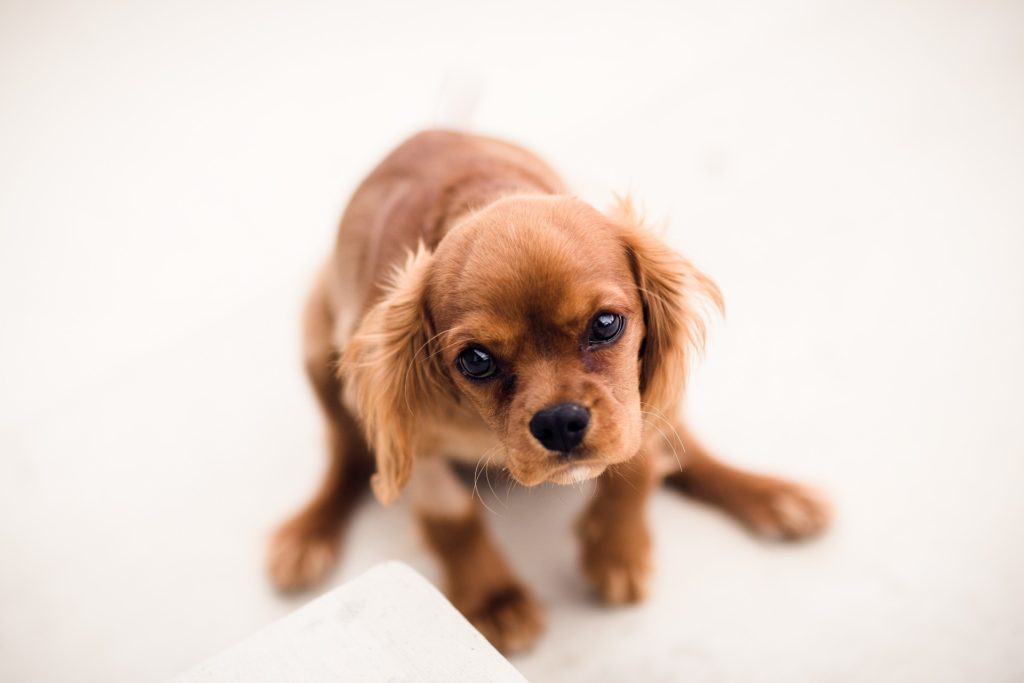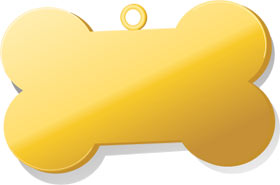
If you’ve recently adopted a puppy, you’re probably thrilled. There’s a new fur ball in your life, and you may find yourself spending all your free time playing with him, making sure he is comfortable, teaching him to do his business outside, and generally just spending time hanging around with your new best friend.
Eventually, though, duty calls. You have other life responsibilities – work, family, etc. – and will have to leave your buddy behind. You may have mixed feelings when you leave your puppy at home. You miss your puppy, and you worry if he is okay – or if he is tearing apart your house!
This combination of feelings that includes worry and longing for companionship could be described as separation anxiety – and it’s something your new puppy may very well suffer from too. Even though you have just met your new puppy, he is most likely already completely attached to you. He has only recently left his mother and his pack, and is already settling in as a part of his new pack – you and your family.
He looks to you, the pack leader, for direction, attention, and love. And when you leave, he may be confused, hurt, scared, and anxious. While you may suffer some level of separation anxiety, you are a human adult, and presumably can handle some level of emotional discomfort from being away from your puppy.
For your puppy, however, separation anxiety can become a severe emotional and sometimes physical condition. When you leave him alone, he can get scared, lonely, and anxious. Puppy separation anxiety is real, and it’s a problem that many dog owners will experience – especially if they can’t spend as much time as they would like at home.
Puppy Separation Anxiety: What Is It?

“Separation anxiety” is a catch-all term that describes feelings and behavioral issues that occur with your dog when he is alone at home without you. Separation anxiety happens to both puppies and dogs, but happens more often in puppies. It is a serious condition, and should not be taken lightly. Unfortunately, many new dog owners don’t take it seriously, then end up abandoning their new dog when they exhibit behavior problems at home.
The word “anxiety” gets tossed around liberally as a descriptor of any worries or uncomfortable feelings you may have. But anxiety is a real condition that affects the way both people and dogs feel and behave. Serious anxiety is much more than a mental condition – it can manifest itself physically as well, affecting sleep, mood, appetite, and more. For dogs with separation anxiety, this can mean destructive behavior as well as emotional stress.
How Do I Know if My Puppy Has Separation Anxiety?
True separation anxiety can be tough to spot – at least early on. Just about every dog gets bummed out when their owner leaves them alone. Dogs prefer the company of humans. If it were up to your dog, he would spend 24 hours a day with you. It’s the reason people love dogs so much – they are almost singularly focused on getting and keeping your attention and love.
While your dog may be upset when you’re not home, it doesn’t necessarily mean he has clinical separation anxiety. It may just mean he misses you and can’t wait until you get home. Dogs who have separation anxiety, though, will exhibit more serious behavioral issues when you are not home – and you can often see the signs starting before you leave your dog.
Dogs with separation anxiety can often sense when you are about to leave them at home. When they do, they will get visibly agitated, anxious, or depressed. Some dogs may even try to stop their owner from leaving by sitting in front of the door. It’s heartbreaking and cute to see, but for your dog, there is real anguish involved in your departure. The real behavioral issues though, start when you leave. If your dog is exhibiting any of the following behaviors when you leave him alone, he may suffer from separation anxiety.
Excessive Barking
The first and most normal reaction a dog with separation anxiety has is to bark incessantly. It’s a way for the dog to cry for help, or to vocally display his displeasure at being left alone. While the barking seems counter-productive to humans, it’s your dog’s only way of communicating displeasure.
Unfortunately, barking can also be very annoying for your neighbors. One of the main reasons people give up on their dogs up is excessive barking. It can take a toll on both dog and owner alike. But it’s not a reason to give up on your dog, especially knowing that dogs can be trained not to bark.
Destructive Behavior
Another common behavior associated with separation anxiety in dogs is destructive acts like chewing and scratching. Your dog may chew the furniture or scratch at the door. He may destroy pillows or root through the trash. The feeling of anxiety is one of helplessness. While your dog does not mean to make a mess, or destroy something you value, destructive acts can help him alleviate the feeling of anxiety physically.
This behavior, though, is not healthy for your dog. It can result in self-injury, including broken teeth, damaged nails, and cut paws. Your dog does not want to be destructive, he just doesn’t know how else to handle it, to both of your detriment.

Bathroom Accidents
Some dogs – but not all – will urinate or defecate in the house when they are left alone. If your dog is fully house trained and only has accidents when you are away from home, this could be a sign of separation anxiety.
If your dog is not housetrained, he will have accidents regardless of whether you are home or not. Most dogs can be potty trained in a couple of weeks, so you should be able to determine why your dog is having accidents when you are not home.
Coprophagia
In more rare cases, a dog may defecate and then consume some or all of his own feces. It’s disgusting to think about, but it can be a sign that your dog has severe separation anxiety. This condition is not only found in dogs with anxiety.
For some dogs coprophagia is a lifetime condition. But if your dog doesn’t display this behavior on a regular basis, but does consume feces when you are not home, there is a good chance he is suffering from separation anxiety.
Frantic Pacing
When a dog’s mind is dealing with anxiety, his body manifests a lack of comfort, often in the form of constant and frantic pacing. It’s nervous energy being expelled. While pacing is not harmful or destructive, it is a tell-tale sign that your dog is suffering from some level of mental anguish, and possibly a case of separation anxiety.
Attempting to Escape
Dogs with severe separation anxiety may try to escape the second you leave. He may scratch and attempt to dig under the door. He may try to push or scratch the windows, or attempt to yank down curtains. Like other destructive behavior, escape attempts can end up injuring your dog. Escape attempts are a desperate act, but severe anxiety can lead dogs to try.
Why Do Dogs Get Separation Anxiety?
The reasons why some dogs get separation anxiety and others do not are unclear. Just like humans, each dog has a unique personality with unique quirks. Some dogs are just more apt to be lonely to the point of mental anguish than others.
While evidence is somewhat scarce, it is believed that shelter dogs are more apt to develop separation anxiety due to past experience. In many cases, these dogs have been abandoned by their previous owners – some more than once – so the condition is a learned reaction. Of course, not all shelter dogs are prone to this condition. Many are just happy that they have a new home at all.
While there are no specific breeds that suffer more from separation anxiety, there is some evidence to support people-focused breeds and smaller dogs being more susceptible. Any dog can get lonely and scared when you’re not home. If your dog does have separation anxiety though, you will want to catch it early so you can help him overcome it, and make both of your lives together more satisfying.
What You Can Do to Ease Your Puppy’s Separation Anxiety

If your dog is suffering from separation anxiety, there are a variety of measures you can take to help him overcome his fears. Far too many owners abandon dogs because of separation anxiety. And while it can be difficult to deal with, you and your dog will be much happier if you overcome it together instead of abandoning him, which will make his anxiety far worse when he does find another home.
Separation anxiety is fixable with some patience and the right approach. Try the following tactics:
Crate Training
Regardless of your dog’s personality, you should always crate train if possible. It may look like puppy jail, but a crate can help you make your dog feel safe and comfortable. Crate training your dog attempts to recreate the natural surroundings that wild dogs grew up in.
Dogs in the wild are den animals who prefer small, enclosed spaces to rest and retreat to. It makes them feel safe and protected, not locked away. While your dog will probably whine the first time you put him in the crate, he will quickly get used to it – and even prefer it. As a bonus, locking your dog in his crate will stop him from being destructive while you are away, and help house train him as well – since dogs will not want to urinate or defecate in the same space they sleep.
After a few days of being in the crate, your dog will adjust. He may even treat the crate as his secret lair, and go inside every time he wants to feel comfortable, or has a toy to hide, or simply wants to take a nap. You can make your dog’s crate more comfortable by putting blankets and toys inside. For dogs with separation anxiety, leaving an article of your clothing with your smell on it will help remind him that you will come back to him.
Exercise
Sedentary lifestyles can lead for depression and anxiety in both humans and dogs. Making sure your pup gets the requisite amount of exercise will go a long way towards keeping him both physically and mentally fit. Dogs who get plenty of exercise feel more engaged with their owners and more confident in themselves.
If your dog has severe separation anxiety, try taking him out for some strenuous exercise before you leave the house for the day. If your dog is tired from playing, he’ll be less apt to freak out when you leave for the day.
Mental Conditioning
With the right training approach, you can condition your dog to learn that separation is not always a bad thing. When you first leave your puppy behind, his immediate reaction is to freak out and wonder if you’re ever coming back. The worse his stress level gets, the more pronounced the separation anxiety becomes. But you can teach your dog that separation can actually be a good thing.
Try giving him a special treat or toy – one he would not get under normal circumstances – right before you leave. At first, only leave for short periods of time, so you dog doesn’t have a chance to get too stressed out. Slowly stay away for longer and longer periods, but always give him that high-value treat just before you go. Over time, he may start to look forward to your departure!
Medication and Supplements
For some dogs, all the training, exercise and conditioning in the world won’t cure their separation anxiety. In these cases, your vet may suggest prescription medications – like alprazolam, which is prescribed for anxiety and panic disorders or certain anti-depression meds. Natural supplements are a good option too, as they do not require a prescription and have little to no negative side effects. Before giving your dog any medication or supplement however, always consult with your vet.

It really hurts. Little time without my fur ball is painful. I know he feels the same.